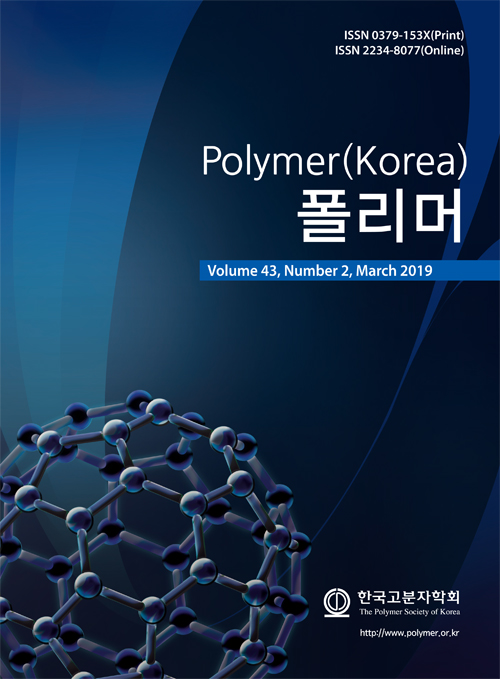- Effects of Isosorbide on the Microphase Separation and Properties of Waterborne Polyurethane Coatings
Jun Hu, Can Tao, Aining Yuan, Junjie Bao, Qin Cheng, Gewen Xu, and Yiping Huang†

School of Chemistry and Chemical Engineering, Anhui University, Key Labortory of Environment-friendly Polymer Materials of Anhui Province, Hefei 230601, People's Republic of China
- 수분산 폴리우레탄 코팅의 미세상분리와 물성에 Isosorbide가 미치는 영향
Series of waterborne polyurethanes (WPUs) containing poly(tetra methylene glycol) (PTMG), 4,4-dicyclohexylmethane diisocyanate (HMDI), 2,2-dimethylolpropionic acid (DMPA), 2,2,4-trimethyl-1,3-pentanediol (TMPD), isosorbide (ISO) and ethylenediamine (EDA) were synthesized. The effects of ISO on the structure and properties of WPUs were studied by gel permeation chromatography (GPC), Fourier-transform infrared spectroscopy (FTIR), differential scanning calorimetry (DSC), dynamic mechanical analyzer (DMTA), X-ray diffraction (XRD), thermogravimetry (TG), mechanical test, chemical resistance and hardness test. The deconvolution analysis of FTIR of WPUs revealed that the hydrogen bond interaction in the WPUs increased with the increase of ISO content. Furthermore, the degree of microphase separation was increased with the increase of hydrogen bond interaction, which was confirmed by DSC, XRD and DMTA test. The results demonstrated that the addition of ISO can increase the hydrogen bond interaction between the hard and hard segments in WPUs, which improved the mechanical properties of the WPU films. The highest tensile strength was obtained of 59.67 MPa when the content of isosorbide was 10.35 wt%. Moreover, the ISO was helpful to improve the chemical resistance and hardness of the coatings by the comprehensive performance analysis. Keywords: isosorbide, micro-phase separation, waterborne polyurethane, mechanical properties.
Keywords: isosorbide, micro-phase separation, waterborne polyurethane, mechanical properties
- Polymer(Korea) 폴리머
- Frequency : Bimonthly(odd)
ISSN 0379-153X(Print)
ISSN 2234-8077(Online)
Abbr. Polym. Korea - 2023 Impact Factor : 0.4
- Indexed in SCIE
 This Article
This Article
-
2019; 43(2): 169-180
Published online Mar 25, 2019
- 10.7317/pk.2019.43.2.169
- Received on Jul 6, 2018
- Revised on Nov 8, 2018
- Accepted on Dec 28, 2018
 Correspondence to
Correspondence to
- Yiping Huang
-
School of Chemistry and Chemical Engineering, Anhui University, Key Labortory of Environment-friendly Polymer Materials of Anhui Province, Hefei 230601, People's Republic of China
- E-mail: yphuang@sina.com.cn









 Copyright(c) The Polymer Society of Korea. All right reserved.
Copyright(c) The Polymer Society of Korea. All right reserved.